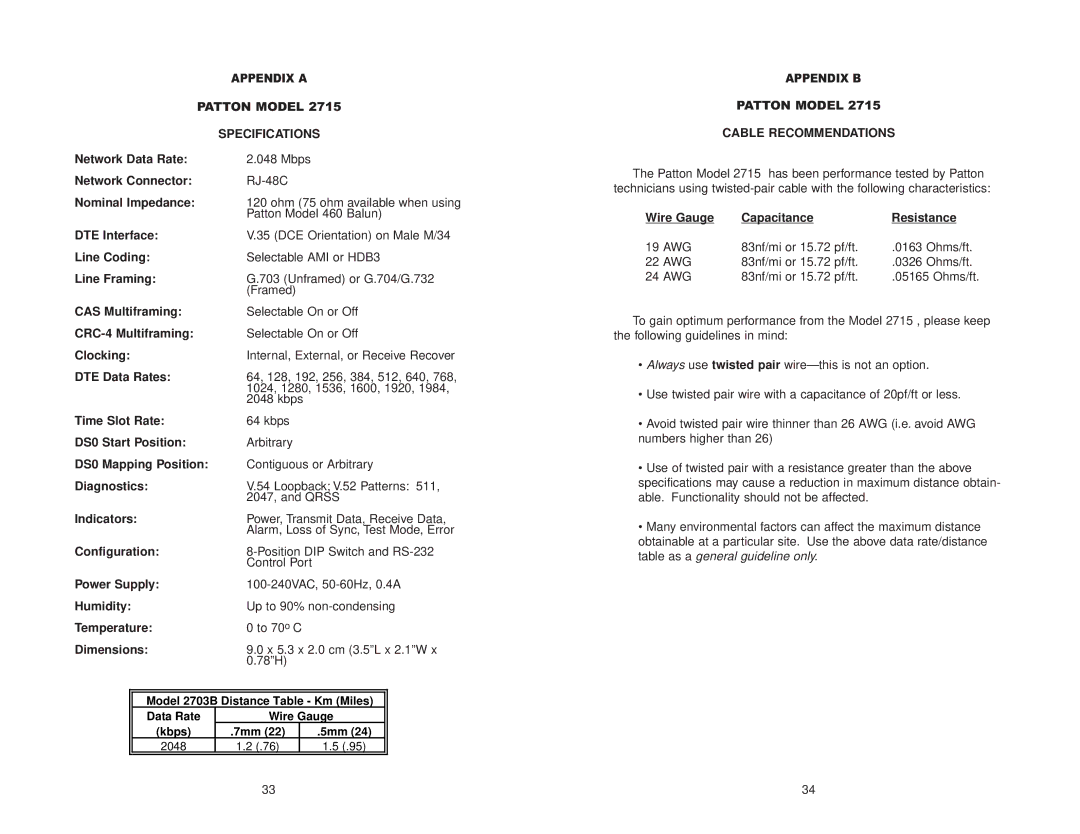|
| APPENDIX A |
|
| |
| PATTON MODEL 2715 | ||||
|
| SPECIFICATIONS | |||
Network Data Rate: | 2.048 Mbps |
|
| ||
Network Connector: |
|
| |||
Nominal Impedance: | 120 ohm (75 ohm available when using | ||||
|
| Patton Model 460 Balun) | |||
DTE Interface: | V.35 (DCE Orientation) on Male M/34 | ||||
Line Coding: | Selectable AMI or HDB3 | ||||
Line Framing: | G.703 (Unframed) or G.704/G.732 | ||||
|
| (Framed) |
|
| |
CAS Multiframing: | Selectable On or Off | ||||
Selectable On or Off | |||||
Clocking: | Internal, External, or Receive Recover | ||||
DTE Data Rates: | 64, 128, 192, 256, 384, 512, 640, 768, | ||||
|
| 1024, 1280, 1536, 1600, 1920, 1984, | |||
|
| 2048 kbps |
|
| |
Time Slot Rate: | 64 kbps |
|
| ||
DS0 Start Position: | Arbitrary |
|
| ||
DS0 Mapping Position: | Contiguous or Arbitrary | ||||
Diagnostics: | V.54 Loopback; V.52 Patterns: 511, | ||||
|
| 2047, and QRSS | |||
Indicators: | Power, Transmit Data, Receive Data, | ||||
|
| Alarm, Loss of Sync, Test Mode, Error | |||
Configuration: | |||||
|
| Control Port |
|
| |
Power Supply: | |||||
Humidity: | Up to 90% | ||||
Temperature: | 0 to 70o C |
|
| ||
Dimensions: | 9.0 x 5.3 x 2.0 cm (3.5”L x 2.1”W x | ||||
|
| 0.78”H) |
|
| |
|
|
|
|
| |
| Model 2703B Distance Table - Km (Miles) |
| |||
| Data Rate | Wire Gauge |
| ||
| (kbps) | .7mm (22) |
| .5mm (24) |
|
| 2048 | 1.2 (.76) |
| 1.5 (.95) |
|
|
|
|
|
|
|
APPENDIX B
PATTON MODEL 2715
CABLE RECOMMENDATIONS
The Patton Model 2715 has been performance tested by Patton technicians using
Wire Gauge | Capacitance | Resistance |
19 AWG | 83nf/mi or 15.72 pf/ft. | .0163 Ohms/ft. |
22 AWG | 83nf/mi or 15.72 pf/ft. | .0326 Ohms/ft. |
24 AWG | 83nf/mi or 15.72 pf/ft. | .05165 Ohms/ft. |
To gain optimum performance from the Model 2715 , please keep the following guidelines in mind:
•Always use twisted pair
•Use twisted pair wire with a capacitance of 20pf/ft or less.
•Avoid twisted pair wire thinner than 26 AWG (i.e. avoid AWG numbers higher than 26)
•Use of twisted pair with a resistance greater than the above specifications may cause a reduction in maximum distance obtain- able. Functionality should not be affected.
•Many environmental factors can affect the maximum distance obtainable at a particular site. Use the above data rate/distance table as a general guideline only.
33 | 34 |
